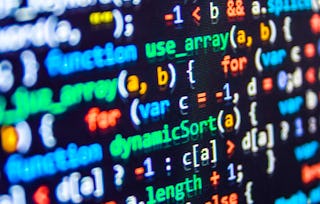Python is a core skill in machine learning, and this course equips you with the tools to apply it effectively. You’ll learn key ML concepts, build models with scikit-learn, and gain hands-on experience using Jupyter Notebooks.

Machine Learning with Python

Machine Learning with Python
This course is part of multiple programs.



Instructors: Joseph Santarcangelo
Access provided by Syrian Youth Assembly
655,426 already enrolled
18,269 reviews
Recommended experience
What you'll learn
Explain key concepts, tools, and roles involved in machine learning, including supervised and unsupervised learning techniques.
Apply core machine learning algorithms such as regression, classification, clustering, and dimensionality reduction using Python and scikit-learn.
Evaluate model performance using appropriate metrics, validation strategies, and optimization techniques.
Build and assess end-to-end machine learning solutions on real-world datasets through hands-on labs, projects, and practical evaluations.
Skills you'll gain
- Feature Engineering
- Predictive Modeling
- Machine Learning
- Unsupervised Learning
- Supervised Learning
- Model Evaluation
- Logistic Regression
- Regression Analysis
- Python Programming
- Decision Tree Learning
- Classification Algorithms
- Scikit Learn (Machine Learning Library)
- Dimensionality Reduction
- Applied Machine Learning
- Skills section collapsed. Showing 9 of 14 skills.
Details to know

Add to your LinkedIn profile
15 assignments
See how employees at top companies are mastering in-demand skills

Build your subject-matter expertise
- Learn new concepts from industry experts
- Gain a foundational understanding of a subject or tool
- Develop job-relevant skills with hands-on projects
- Earn a shareable career certificate from IBM

There are 6 modules in this course
In this module, you will explore foundational machine learning concepts that prepare you for hands-on modeling with Python. You will explain the relevance of Python and scikit-learn in machine learning, summarize the IBM AI Engineering certification path, and classify common types of learning algorithms. You’ll outline the stages of the machine learning model lifecycle and describe what a typical day looks like for a machine learning engineer. You will also compare key roles in the AI field, identify widely used open-source tools, and learn to utilize scikit-learn to build and evaluate simple models.
What's included
8 videos2 readings2 assignments1 plugin
In this module, you will explore two essential regression techniques used in machine learning—linear and logistic regression. You’ll explain the role of regression in predicting outcomes, describe the differences between simple and multiple linear regression, and apply both using scikit-learn on real-world data. You will also interpret how polynomial and non-linear regression models capture complex patterns. The module introduces logistic regression as a classification method and guides you in training and testing classification models effectively. To support your learning, you’ll receive a Cheat Sheet: Linear and Logistic Regression that summarizes key concepts, formulas, and use cases.
What's included
6 videos1 reading3 assignments3 app items1 plugin
In this module, you will build and evaluate a range of supervised machine learning models to solve both classification and regression problems. You’ll start by describing how classification models predict categorical outcomes, and implement multi-class classification strategies using real-world data. You’ll then explore how decision trees make predictions and apply them to both classification and regression tasks. The module also covers using support vector machines (SVM) for fraud detection, applying K-Nearest Neighbors (KNN) for customer classification, and training ensemble models like Random Forest and XGBoost to improve accuracy and efficiency. You’ll differentiate bias and variance in model performance and explore how ensemble methods help balance this tradeoff. To support your learning, you’ll receive a Cheat Sheet: Building Supervised Learning Models with key terms, model types, and evaluation tips.
What's included
6 videos2 readings3 assignments6 app items1 plugin
In this module, you will learn how unsupervised learning techniques uncover hidden patterns in data without using labeled responses. You’ll describe clustering concepts and apply K-Means to real-world customer segmentation tasks. You’ll also compare DBSCAN and HDBSCAN models to identify dense clusters in spatial data. Moving beyond clustering, you’ll explore dimensionality reduction as a tool for simplifying high-dimensional datasets. You’ll apply PCA to uncover key components and use advanced techniques like t-SNE and UMAP to visualize data structure. To support your learning, you’ll receive a Cheat Sheet: Building Unsupervised Learning Models, highlighting core methods, practical use cases, and comparison guidelines.
What's included
5 videos1 reading3 assignments4 app items1 plugin
In this module, you will learn how to assess the effectiveness of machine learning models using industry-standard evaluation and validation techniques. You’ll explain key classification and regression metrics, evaluate models using real-world data, and interpret results with tools like confusion matrices and feature importance charts. You'll explore how to assess clustering quality in unsupervised learning and apply cross-validation to reduce overfitting. The module also introduces regularization methods to improve model generalization and reduce feature complexity. Finally, you'll build complete machine learning pipelines and optimize them with GridSearchCV, while identifying common pitfalls like data leakage. To support your learning, you’ll receive a Cheat Sheet: Evaluating and Validating Machine Learning Models covering key metrics, techniques, and model tuning strategies.
What's included
6 videos1 reading3 assignments5 app items1 plugin
In this final module, you will apply and demonstrate the full range of skills you have gained throughout the course. You will start with a practice project using the Titanic dataset to build and optimize classification models using pipelines, cross-validation, and hyperparameter tuning. Then, you will complete the final project by developing a rainfall prediction classifier using historical weather data. This includes data cleaning, feature engineering, model building, and evaluating performance. To conclude the course, you will take a graded final exam that tests your knowledge across all six modules. This module gives you the opportunity to showcase your learning in both practical and theoretical contexts.
What's included
1 video3 readings1 assignment3 app items
Earn a career certificate
Add this credential to your LinkedIn profile, resume, or CV. Share it on social media and in your performance review.
Instructors



Offered by
Why people choose Coursera for their career

Felipe M.

Jennifer J.

Larry W.

Chaitanya A.
Learner reviews
- 5 stars
75.96%
- 4 stars
18.59%
- 3 stars
3.44%
- 2 stars
0.99%
- 1 star
1.01%
Showing 3 of 18269
Reviewed on Dec 31, 2019
could be split in two courses to be given enough focus. it was very condensed and needed more time and explanation in each section. The instructor was very good but more details would have been nice
Reviewed on Jan 14, 2025
good course , some part is typical more statistical part shown, even i have good understanding of ML , so new learner will find little typical. rest tutor voice and language is understandable.
Reviewed on Oct 8, 2020
I'm extremely excited with what I have learnt so far. As a newbie in Machine Learning, the exposure gained will serve as the much needed foundation to delve into its application to real life problems.
Explore more from Data Science

O.P. Jindal Global University

Arizona State University



